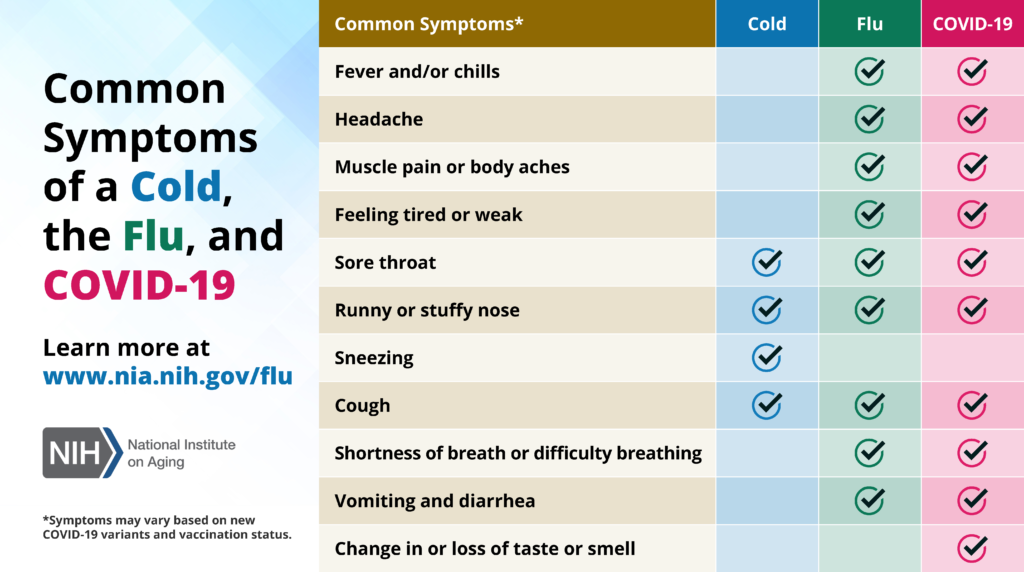
With cold and flu season approaching and COVID-19 still lingering, it can be difficult to distinguish between the three. All three illnesses share common symptoms, but each also has unique traits.
While a cold has similar symptoms to both the flu and COVID-19, cold symptoms will generally be milder and include a runny/stuffy nose. Flu and COVID-19 symptoms tend to be more serious and can lead to fever, chills, body aches and gastrointestinal symptoms. If you are experiencing signs or symptoms consistent with one of these illnesses, it is important to still undergo diagnostic testing to confirm a diagnosis.

(https://www.NIA.NIH.gov/Health/Covid-19/It-Cold-Flu-or-Covid-19)
Because the symptoms of the cold, flu and COVID-19 infection overlap, similar over-the-counter medications may be used to alleviate your symptoms. Determining which symptom(s) you are experiencing can help you determine which medication is right for you.
- To reduce a fever or manage pain: Analgesics such as acetaminophen or ibuprofen. If you are using multiple medications to manage your symptoms, it is important to look at the labels, as many of these products contain analgesics. If you have underlying health conditions, it is important to talk to your doctor to determine which analgesic is best for you.
- To relieve a sore throat: Oral lozenges. Look for the ones containing benzocaine. This is a topical anesthetic and will provide pain relief directly to your throat after dissolving in the mouth.
- To reduce coughing: Dextromethorphan. This ingredient can be found in many cough syrup formulations, including Robitussin® and Delsym®. If you are diabetic or struggle with elevated blood glucose, sugar-free formulations are available.
- To dry out the nose/sinus passages: Antihistamines including loratadine (Claritin®), fexofenadine (Allegra®), cetirizine (Zyrtec®), etc. These medications may cause drowsiness, urinary retention and other drying effects. Taking them at night could help prevent daytime drowsiness.
- For a stuffed/clogged nose: Decongestants such as pseudoephedrine (Sudafed®). This medication can cause increased blood pressure, insomnia and restlessness. You should avoid this medication if you are pregnant or have uncontrolled blood pressure. You will have to purchase Sudafed® at a pharmacy and provide your photo ID. If you do suffer from high blood pressure, better options include Coricidin HBP and/or saline nasal rinses (NeilMed® sinus rinse, Neti Pot, etc.).
Over-the-counter medications used to treat these symptoms tend to have multiple ingredients. It is very important to look at the active ingredients of the medications you buy to ensure you are not taking the same ingredient in multiple formulations.
Additionally, if you have underlying health conditions, contact your doctor or health care provider before starting any new medications, including over-the-counter medications. This can help prevent unwanted side effects or drug interactions.
You can call UofL Health’s Primary Care Hotline Monday-Friday at 502-588-4343 to schedule an appointment.
References:
- Similarities and differences between flu and covid-19 . Centers for Disease Control and Prevention. https://www.cdc.gov/flu/symptoms/flu-vs-covid19.htm. Published June 7, 2021. Accessed October 14, 2021.
- Symptoms of COVID-19. Centers for Disease Control and Prevention. https://www.cdc.gov/coronavirus/2019-ncov/symptoms-testing/symptoms.html. Published February 22, 2021. Accessed October 20, 2021.
- Flu: What To Do If You Get Sick. https://www.cdc.gov/flu/treatment/takingcare.htm. Published December 15, 2022. Accessed January 1, 2024.
- Yáñez JA, Chung SA, Román BR, et al. Prescription, over-the-counter (OTC), herbal, and other treatments and preventive uses for COVID-19. Environmental and Health Management of Novel Coronavirus Disease (COVID-19 ). 2021;379-416.









